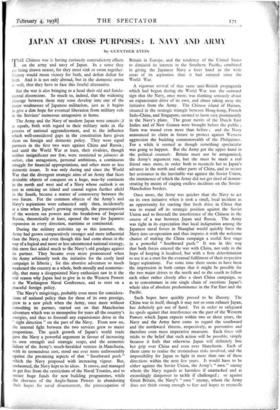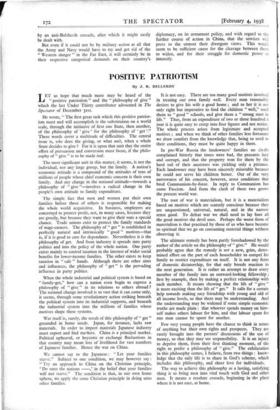JAPAN Al CROSS PURPOSES: I. NAVY AND ARMY
By GUENTHER STEIN
THE Chinese war is having curiously contradictory effects on the army and navy of Japan. In a sense they are being drawn nearer, for they must sink or swim together. Victory would mean victory for both, and defeat defeat for both. And it is not only abroad, but in the domestic arena as well, that they have to face this fateful alternative.
But the war is also bringing to a head their old and funda- mental dissensions. So much so, indeed, that the widening cleavage between them may soon develop into one of the major weaknesses of Japanese militarism, just as it begins to give a dim hope for eventual liberation from military rule to the Services' numerous antagonists at home.
The Army and the Navy of modern Japan were concei% as equals, both with regard to their military tasks in t& process of national aggrandisement, and to the influence which well-considered gaps in the constitution have given them on foreign and domestic policy. They were equal partners in the first two wars against China and Russia ; and until the World War at least, their rivalries, though neither insignificant nor few, were restricted to jalousies de métier, clan antagonism, personal ambitions, a continuous struggle for financial appropriations, and other more or less domestic issues. It was only during and since the World War that the divergent strategic aims of an Army that faces desirable objects of conquest on a huge, near-by continent in the north and west and of a Navy whose outlook is on just as enticing an island and coastal region further afield in the South, became a matter of controversy between the two forces. For the common objects of the Army's and Navy's aspirations were exhausted only then, incidentally at a time when Japan's growing strength, the preoccupation of the western sea powers and the breakdown of Imperial Russia, theoretically at least, opened the way for Japanese expansion in every direction, maritime or continental.
During the military activities up to this juncture, the Army had grown comparatively stronger and more influential than the Navy, and even though this had come about in the way of a logical and more or less uncontested national strategy, this mere fact added much to fle-Nayy's old grudges against its partner. They became even more pronounced when the Army arbitrarily took the initiative for the costly land campaign in Siberia ; for this abortive adventure so much weakened the country as a whole, both morally and economic- ally, that many a disappointed Navy enthusiast saw in it the real reason why Japan had to give in to the Western Powers at the Washington Naval Conference, and to start on a peaceful foreign policy.
The Navy's misgivings, probably even more for considera- tions of national policy than for those of its own prestige, grew to a new pitch when the Army, once more without consulting its partner, started out on that Manchurian adventure which was to monopolise for years all the country's energies, and thus to forestall any expansionist drive in the "right direction" on the part of the Navy. From now on, the internal fight between the two services grew to major proportions. The quick growth of Japan's world trade gave the Navy a powerful argument in favour of increasing its own strength and strategic scope, and the economic failure of the Army's much-heralded venture in Manchuria, with its tremendous cost, stood out ever more unfavourably against the promising aspects of that "Southward push" which the Navy proposed with increasing vigour. But, undaunted, the Navy kept to its ideas It strove, and managed to get free from the restrictions of the Naval Treaties, and to secure huge funds for new building programmes, while the slowness of the Anglo-Saxon Powers in abandoning their hopes for naval disarmament, the preoccupation of Britain in Europe, and the tendency of the United States to diminish its interest in the Southern Pacific, combined in giving the Japanese Navy a freer hand in the wide areas of its aspiration than it had enjoyed since the World War.
A vigorous revival of that same anti-British propaganda which had begun during the World War was the outward sign that -the Navy, once more, was thinking seriously about an expansionist drive of its own, and about taking away the initiative from the Army. The Chinese island of Hainan, situated in the strategic triangle between Hong-kong, French Indo-China, and Singapore, seemed to loom very prominently in the Navy's plans. The great merits of the Dutch East Indies and of New Guinea were brought before the public ; Siam was wooed even more than before ; and the Navy announced its claim in future to protect against Western aggression the budding commonwealth of the Philippines. For a while it seemed as though something spectacular was going to happen. But the Army got the upper hand in the political counsels. Britain must not be antagonised, the Army's argument ran, but she must be made a real friend once more, in order both to reconcile her to Japan's advance in the north and other parts of China, and to secure her assistance in the inevitable war against the Soviet Union, the imminence of which the Army did not get tired of demon- strating by means of staging endless incidents on the Soviet- Manchukuo borders.
Once more, the Army was quicker than the Navy to act on its own initiative when it took a small, local incident as an opportunity for starting that fresh drive in China that was to round off its strategic position against the Soviet Union and to forestall the interference of the Chinese in the course of a war between Japan and Russia. The Army was right in its expectation that local indignation among the Japanese naval forces in Shanghai would quickly force the Navy into co-operation and thus impress it with the welcome chance of making the China campaign a useful first stage in a powerful "Southward push." It was in this way that both forces entered the war with China, not only in the hope of keeping it localised, but with a firm determination to use it as a start for the eventual fulfilment of their respective larger aspirations. For some time there seems to have been the impression in both camps that it might be possible for the two major drives to the north and to the south to follow each other rather closely after a short China campaign, so as to consummate in one single chain of exertions Japan's whole idea of absolute predominance in the Far East and the Pacific.
Such hopes have quickly proved to be illusory. The China war in itself; though it may not so soon exhaust japan, has definitely got out of hand. Yet in order to safeguard its spoils against that interference on the part of the Western Powers which Japan expects within two or three years, the Navy and the Army have come to regard the southward and the northward thrusts, respectively, as preventive and therefore even more imperative measures. Each force still sticks to the belief that such action will be possible, simply because it feels that otherwise Japan will definitely lose her grip over China and even over Manchuria. Each of them came to realise the tremendous risks involved, and the impossibility for Japan to fight in more than one of these directions within the next few years. It would have to be either against the Soviet Union, the Army's " own " enemy whom the Navy regards as harmless if unattacked and as exceedingly dangerous to tackle if challenged ; or against Great Britain, the Navy's " own " enemy, whom the Army does not think strong enough to fear and hopes to reconcile by an anti-Bolshevik crusade, after which it might easily be dealt with.
But even if it could not be by military action at all that the Army and Navy would have to try and get rid of the "Western danger" in the Far East, it will certainly be in their respective categorical demands on their country's diplomacy, on its armament policy, and with regard to the further course of action in China, that the services will press to the utmost their divergent views. This would seem to be sufficient cause for the cleavage between them to widen, and for their struggle for domestic power to intensify.















































 Previous page
Previous page